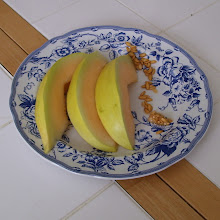Is there not a Surrealist painting involving a nose in the sky? There really should be. Think of it, a blue sky, a giant pair of nostrils, some smoke rising toward them, perhaps even a Cheshire cat-like smile floating in the air, appreciating the pleasing odors.
This week, in Parashat Vayikra, G-d tells the Israelites how to make sacrifices by fire, many of which generate "a pleasing odor to [G-d]." I remember in the days before my conversion to Judaism telling my mother about the notion of G-d appreciating smells. I had also recently been telling her that G-d doesn't have a body. If G-d has no body, G-d has no nose, she responded. I can't argue with that.
But somehow I find it more possible to believe in a spirit appreciating smells than, say, chowing down on a charred piece of sacrificed animal like--l'havdil!--Santa eating cookies. It's possible to imagine a spiritual being, like G-d, as existing in the air, ethereal. And an odor is just that. Odors and spirits seem compatible. Additionally, smoke from a sacrifice rises, and I tend to think of G-d as being "up there": in the sky, in the Heavens. Even the notion of G-d as being everywhere still puts G-d mostly in the atmosphere, in space.
Why might G-d enjoy pleasing odors? Rashi comments that G-d finds the odors of sacrifices to be "satisfying" not for the smell itself necessarily but as evidence that the people are following the commandments. Perhaps the smell of a sacrifice is like that little strip of color blocks on a potato chip bag that a scanner can check to see that all the colors are printing properly and that hopefully the image, which the scanner can't see, looks okay. A pleasing odor signals that the commandments surrounding sacrifices are being followed--and hopefully the others, too.
Rashi later wonders at the reason for leaving the feathers on a bird being sacrificed: "But surely you will not find even a common sort of man who can smell the odour of burnt feathers without being disgusted with it! Why, then, does Scripture say that it shall be offered with the feathers?" Rashi asks. Does G-d truly think that burnt feathers smell good? The answer Rashi gives is that the offering "makes a finer show" with the feathers on. The parsha later notes that if a person can't afford a sheep for a sin offering, they may offer birds instead. Birds, therefore, are the offering of the poor, Rashi notes, and that's why there's an incentive to make them look as grand as possible--even if the odor of burning feathers is not pleasing to our own noses.
The Hebrew word translated as "pleasing" in the phrase pleasing odor, נִיחֹ֖חַ, is defined as "soothing, quieting, transquillizing." I find that last definition compelling. Imagine, the idea of producing a sort of tranquillizer or anesthesia that G-d would breathe in. In a moment of fear, the Israelites might want to render G-d a little less powerful, to sedate G-d a little bit. In other moments, when G-d seems less frightening, the idea of soothing or pleasing G-d might be more fitting.
What seems to connect most to my life in this parsha at this time is the notion of wanting people to do something (in this case, to burn an offering) less for the outcome of the action itself (the pleasing odor) than as a sign of fidelity. The idea that G-d would be satisfied, as Rashi said, by the odor as a signal that the Israelites were following the commandments reminds me of what my therapist says about requests I make of her. Sometimes, she supposes, I may want her to do certain things, like answer an email or give me a call, not so much because the I need the answer but because her giving me what I asked for would be a sign that she cared. Still cared. And still cared this week too. Why do I need such signals, rather than just having faith or remembering our history?
Maybe G-d, like me, needs a lot of reminders that people still care. Or G-d used to need those reminders. We no longer make sacrifices. Instead, we pray. I can't think of any particular pleasing odors that arise at our services. But we do light candles, which turn into CO2 and smoke (and water and energy). I hope G-d is pleased.
Shabbat Shalom, and have a good Purim!

No comments:
Post a Comment